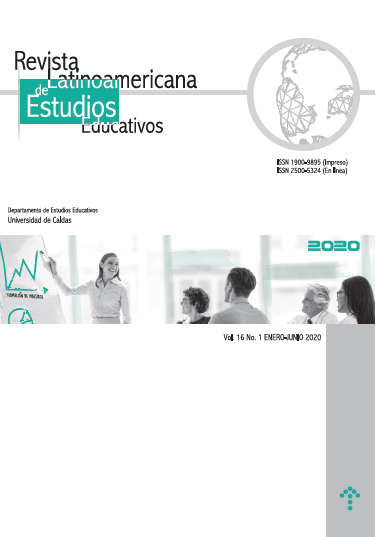Autores
Resumo
This research was done to arise students and teachers consciousness about the importance of integrating technology, which allows students to keep learning and improving out of their class time. The objective was to determine the effect of integrating the virtual platform Memrise as a teaching tool. The methodology used a quantitative approach that aims to better understand the results measurement, based on the information obtained from the pre-test, post-tests and Memrise’s database. The context was a program of foreign languages at a Colombian University in the 2018B period for students of the second semester of a Foreign Languages program, integrating the virtual platform Memrise. The conclusion was that the effect of integrating the virtual platform Memrise as a teaching tool for English vocabulary was effective, even though this application was not interesting or easy to use for some students.
Referências
Cao Y. (2013) Cultivation of autonomous learning ability-essential requirement for college students. In: Zhong Z. (eds) Proceedings of the international conference on information engineering and applications (IEA) 2012. Lecture notes in electrical engineering. 217,11–18. https://doi.org/10.1007/978-1-4471-4850-0_2
Eldow, A., Shakir, M., Abdullah, M. Y., and Malik, S. I. (2017). Using information communication technology as a teaching tool in Sudanese Governmental Universities of Khartoum State. JOIV : International Journal on Informatics Visualization, 1(4), 150-156. https://doi.org/10.30630/joiv.1.4.55
Gafni, R., Achituv, D. B., and Rachmani, J. (2017). Learning Foreign Languages Using Mobile Applications. Journal of Information Technology Education: Research, 16, 301-317.
González, H. (2015). La integración de la tecnología como herramienta significativa en la enseñanza del inglés como lengua extranjera. Horizontes Pedagógicos. 17(1), 53-66.
González, H., Villota, J. and Medina, P. (2017). Strategies used by professors through virtual educational platforms in face-to-face classes: a view from the Chamilo platform. English language teaching, 10(8), 1-10. http://doi.org/10.5539/elt.v10n8p1
González, H., Ramírez, A. and Villota, J. (2019). Integrating technology In the improvement and motivation of learning english as a foreign language. International journal of scientific & technology research. 8(10), 32-37
Gupta, S., and Seth, A. (2014). Web 2.0 Tools in Higher Education. Trends in Information Management, 10(1), 1–11.
Gürkan, S. (2018). The Effects of a Mobile Assisted Vocabulary Learning Application on Vocabulary Learning. Turkish Online Journal of Qualitative Inquiry, 9(3), 288–311. https://doi.org/10.17569/tojqi.407512
Hernández, R. Fernández, C. and Baptista, P. (2004). Metodología de la Investigación. México: McGraw-Hill Interamericana.
Kocaman, O., Yıldız, M. and Kamaz, B. (2018). Use of Vocabulary Learning Strategies in Turkish as a Foreign Language Context. International Journal of Psychology and Educational Studies, 5(2), 54-63
Little, D. Dam, L. and Legenhausen, L. (2017). Language learner autonomy: theory, practice and research. UK : Multilingual Matters.
MacFarlane, A. (2004). Motivational Strategies in the Language Classroom (review). The Canadian Modern Language Review / La revue canadienne des langues vivantes, 61(2), 287–289. https://doi.org/10.1353/cml.2005.0007
Miraz, S. and Ali, M. (2018). Mobile Assisted Language Learning (MALL) – A Brief Survey. Annals of Emerging Technologies in Computing (AETiC), 2(2), 37-45
Mishou, M. (2017). Second language acquisition theories as reflected in Call and MALL. Scientific educational journal. 5(2),17-28.
Nasrollahi, K., and Daneshfar, S. (2018). The effect of visual contextual support and glossary of words on guessing meaning of new vocabulary items in english by pre-university male EFL students. Journal of Language Teaching and Research, 9(3), 561-572. https://doi.org/10.17507/jltr.0903.16
Oni, O., Odaro-Ekhaguebo, K., & Akpoduado, E. (2018). Assessment of information communication technology proficiency of secondary school teachers. Journal of Pedagogical Research, 2(1), 46-54.
Oxford, R. and Scarcella, R. (1994). Second language vocabulary learning among adults: State of the art in vocabulary instruction. System, 22(2), 231-243. https://doi.org/10.1016/0346-251X(94)90059-0
Radin, J. (2017). Mobile assisted language learning: advantages and use among different age groups. Scientific Bulletin of the Politehnica University of Timişoara Transactions on Modern Languages. 16(1), 79-92.
Smith, T. (2013). Qualitative and quantitative research. Research Starters: education (online edition)

 PDF (Español)
PDF (Español)
 FLIP
FLIP























